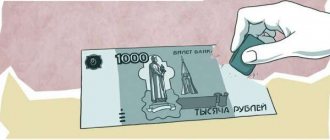Example situation
In what case can an individual receive payments related to the violation of his rights? A typical example is a developer delaying the completion of housing construction.
In this case, in accordance with the shared construction agreement, the shareholder may demand a penalty. In addition, a citizen faces real costs associated with the need to rent housing; he can also demand reimbursement from the developer. In addition, an individual has the right to demand compensation for moral damage. To receive these payments you have to go to court, which means legal costs are inevitable.
Let us assume that in the situation under consideration, the court decided to satisfy all the claims of the shareholder, namely, it obliged the developer:
- pay the contractual penalty;
- compensate for the costs of rented housing;
- compensate for moral damage;
- reimburse legal costs.
The question arises: should personal income tax be paid on these amounts? And if so, who should transfer it to the budget? Let's look at what the Ministry of Finance says about this (letter No. 03-04-05/44154 dated June 27, 2018).
Example 1. Withholding personal income tax from a penalty collected by court
Moskvich, Belsky N.N. entered into an equity participation agreement (DPA) with the developer in January 2021 for the construction of a two-room apartment. According to the terms of this agreement, the shareholder paid the required cost of the apartment according to the DDU within the established time frame. However, the developer delayed the delivery of the house. As a result, Belsky I.N. went to court, demanding to collect a penalty from him for delay.
The court found the claims of the plaintiff (Belsky N.N.) justified. By a court ruling dated June 26, 2021, a penalty in the amount of RUR 200,000 was collected from the developer in favor of the shareholder. rub. This amount is recognized as the income of citizen N.N. Belsky and is subject to personal income tax. Since he is a resident of the Russian Federation, when calculating income tax payable, a rate of 13% is used.
The total is: 200,000 RUR. rub. * 13% = RUR 26,000 rub. This is the amount of personal income tax that will need to be paid.
On what amounts do you need to pay personal income tax?
Let us immediately note that from the letter it follows that personal income tax must be paid on the amount of the penalty that the citizen received. Let's figure out why the Ministry of Finance believes this way.
The penalty is described in Article 330 of the Civil Code. It refers to fines and penalties that are paid by the debtor to the creditor by virtue of an agreement or law. An agreement concluded with a shareholder in accordance with the law on shared construction 214-FZ may provide for the payment of such a penalty for violation by the developer of the deadline for delivery of the project.
The Ministry of Finance believes that amounts in the form of fines and penalties have signs of economic benefit and are the income of an individual . In particular, this follows from the law 214-FZ itself, as well as from the law on the protection of consumer rights No. 2300-1. Since these amounts are income, then income tax must be paid on them. Since among the exceptions specified in Article 217 of the Tax Code of the Russian Federation, these types of payments are not available.
By the way, not only the Ministry of Finance thinks so. The review of judicial practice, approved by the Presidium of the Supreme Court on October 21, 2015, states the following. The penalty is purely punitive in nature and is not compensation for costs. Accordingly, the person who received it receives a benefit that should be subject to personal income tax. It does not matter that the individual received a penalty because his rights were violated.
Income tax for an individual on the amount received as a penalty from the Developer
Dear readers! The writing of this article was prompted by a letter I received from the Developer with whom an equity participation agreement was concluded under Federal Law 214.
The contents of the letter were as follows:
Due to the impossibility of withholding, we notify you of the need to pay personal income tax in the amount of... rubles from the amount of income you received in the form of a penalty in the amount of... rubles.
Since there was no legal system at hand, I immediately rushed to look for an answer to the question of whether the shareholder should pay tax on the received penalty under the DDU.
Two answers were found: yes/no
Today I started a more extensive search for an answer to the question and received an answer that will be useful to many participants in the preschool education:
Penalties (penalties) are not included in the closed list of income from which personal income tax does not need to be withheld (Article 217 of the Tax Code of the Russian Federation).
Therefore, the amount paid by the developer in the event of a violation of the deadline for delivery of a shared construction project to its participant is the income of an individual, subject to personal income tax on a general basis.
Since the payment of amounts of such sanctions leads to the formation of property benefits for the consumer, they are included in the citizen’s income on the basis of the provisions of Articles 41 and 209 of the Tax Code of the Russian Federation, regardless of the fact that the receipt of these amounts is due to a violation of the rights of an individual.
Payments of penalties and fines made to citizens in connection with violation of consumer rights are not exempt from taxation. (Letter of the Ministry of Finance of Russia dated October 28, 2015 No. 03-04-07/62079)
Should an organization always act as a tax agent and withhold personal income tax?
If compensation payments are made by court decision, the developer is obliged to pay the shareholder exactly the amount specified in the decision (Clause 2 of Article 13 of the Code of Civil Procedure of the Russian Federation). Thus, if the amount of personal income tax is allocated in a court decision, the developer is obliged to withhold it.
If the court decision does not indicate the amount of tax, the developer must pay the amount appointed by the court in full and notify the tax office and the taxpayer-shareholder of the impossibility of withholding personal income tax (clause 5 of Article 226 of the Tax Code of the Russian Federation).
In this case, the obligation to file a declaration and pay tax falls on the individual recipient of the income.
This point of view is reflected in Letters of the Ministry of Finance of Russia dated 05/24/2013 N 03-04-06/18724, dated 03/05/2013 N 03-04-05/4-171, dated 06/10/2010 N 03-04-06/10-21 , dated April 22, 2016 No. 03-04-05/23587).
What are the further actions of an individual who has received income in the form of a penalty?
An individual recipient of income will report on income received in Form 3-NDFL, Order of the Federal Tax Service of Russia dated December 24, 2014 No. ММВ-7-11/ [email protected] (hereinafter referred to as the Order).
Clause 1.4 of the Order establishes that when filling out form 3-NDFL, the values of the indicators “are taken from certificates of income and withheld amounts of taxes issued by tax agents at the request of the taxpayer, settlement, payment and other documents available to the taxpayer, as well as from those made on the basis the specified settlement documents."
This means that an individual can fill out the 3-NDFL form on the basis of a 2-NDFL certificate, because sections 3 and 5 of the form contain all the amounts necessary for this. Of course, a notification drawn up by a tax agent in simple written form can also serve as “other documents”.
However, it is not difficult for a tax agent to duplicate the 2-NDFL certificate, compiled for submission to the tax authority, for transmission to the taxpayer, and in addition, this minimizes the possibility of errors.
According to paragraph 3 of Art. 230 of the Tax Code of the Russian Federation, at the request of the taxpayer, tax agents issue certificates to individuals regarding the income received by individuals and the amounts of tax withheld in the form approved by the federal executive body authorized for control and supervision in the field of taxes and fees. We are also talking about form 2-NDFL.
Personal income tax on funds received by the shareholder from the Developer under a writ of execution.
On payment of tax on penalties, fines under the Civil Code, losses, moral damages, legal expenses and on sums of money under a settlement agreement received by the shareholder from the developer as compensation for the delay in transferring the apartment under an equity participation agreement (214-FZ):
Personal income tax penalty (tax on penalty) under an equity participation agreement (DPA) is taxed at a rate of 13%.
Personal income tax on a fine for failure to voluntarily pay a penalty under the DDU is taxed at a rate of 13%.
Legal justification for paying personal income tax on funds collected by court decision: - personal income tax on penalties and fines - we pay:
paragraph 7 of the “Review of the practice of courts considering cases related to the application of Chapter 23 of the Tax Code of the Russian Federation” dated October 21, 2015.
The Supreme Court of the Russian Federation considered that, unlike moral damages and losses, fines and penalties do not serve the purpose of compensating for the consumer’s losses and lead to the formation of income for him, which is subject to taxation at a rate of 13%.
Personal income tax on losses for renting residential premises during construction delays and the difference in interest on the loan are not taxed.
— Personal income tax on losses (only real damage) — we do not pay: clause 7 of the Review. According to the Supreme Court of the Russian Federation, the losses compensated by the court compensate for the real damage of the shareholder, thus falling under paragraph 3 of Art. 217 Tax Code of the Russian Federation. According to the Ministry of Finance, real damage, i.e. renting an apartment during the developer's delay and the difference in interest on the loan is not income and is not taken into account when determining the tax base (letters No. BS-4-11/15526 dated 08.27.2013 and No. 03-04-06/43132 dated 08.28. 2014).
At the same time, documentary evidence of expenses for the tax office is required. However, there shouldn't be any problems here, because... these expenses were verified by the court and taken into account in its decision.
Moral damage is not subject to personal income tax.
Personal income tax on legal expenses (state fees, lawyer fees, notarized power of attorney, postal expenses) is not taxed.
— We do not pay personal income tax on the amount for compensation for moral damage: compensation payment (clause 3 of Article 217 of the Tax Code of the Russian Federation).
5. Personal income tax under a settlement agreement - taxed at a rate of 13%.
- Personal income tax settlement agreement - we pay.
If the settlement agreement approved by the court does not contain information on the calculation of personal income tax, the shareholder will have to pay 13%.
At the same time, if the settlement agreement separately allocates the amounts of real damage to the shareholder - for renting an apartment or for the difference in interest on the loan, then personal income tax is not payable on these amounts (letter of the Ministry of Finance No. 03-04-06/43132 dated August 28, 2014) .
At the same time, documentary evidence of expenses for the tax office is required. However, there shouldn't be any problems here, because... these expenses were verified by the court and taken into account in its decision.
6. Personal income tax legal expenses - we do not pay: paragraph 61 of Art. 217 Tax Code of the Russian Federation.
Let's summarize:
Thus, on the amount of money received under the writ of execution, the shareholder must pay personal income tax at a rate of 13% only on the amount of the penalty and fine.
If the Developer satisfies the shareholder's request to pay the penalty on a voluntary basis, the shareholder should not forget to pay the 13% tax by April 30 if the Developer did not withhold the tax amount as a tax agent and in any case the shareholder must submit a 3-NDFL certificate to Inspectorate of the Federal Tax Service.
To do this, you need to ask the Developer and your employer for a 2-NDFL certificate and, based on them, prepare a 3-NDFL certificate.
There is no need to pay personal income tax on the remaining amounts of money awarded to the shareholder.
Sources:
Review of the Presidium of the Supreme Court of the Russian Federation, Supreme Court of the Russian Federation dated October 21, 2015 No.
Letter of the Ministry of Finance No. 03-04-06/43132 dated 08/28/2014
Letter of the Ministry of Finance of Russia dated October 28, 2015 No. 03-04-07/62079
Order of the Federal Tax Service of Russia dated December 24, 2014 No. ММВ-7-11/ [email protected]
What is not taxed
As for reimbursement of costs, including legal costs, as well as moral damages, according to the Ministry of Finance, there is no need to tax such amounts. Next, we will look at each payment in more detail.
Compensation for moral damage
Moral damage, in accordance with Article 151 of the Civil Code of the Russian Federation, refers to physical or moral suffering caused to a citizen by actions related to his non-property rights and encroachment on his non-material benefits. Whether moral damage will be compensated and in what amount - these issues are decided by the court.
The amount of compensation for moral damage, which is paid in accordance with Article 15 of the Law on the Protection of Consumer Rights on the basis of a court decision, is not subject to personal income tax.
Legal costs
The fact that reimbursement of costs for legal proceedings is not income is stated directly in the Tax Code. Namely, in paragraph 61 of Article 217 . Accordingly, personal income tax is not paid .
Actual expenses
Article 15 of the Civil Code gives a person whose rights have been violated the opportunity to demand compensation for losses suffered by him. This refers to the costs that a person incurs to restore his rights, damaged property or lost profits.
In relation to the example under consideration, the actual expenses are the citizen’s expenses for renting housing, which he had to incur due to the fact that the developer did not complete the construction on time.
Since we are talking about reimbursement of actual costs incurred, the receipt of such amounts does not constitute an economic benefit . That is, these amounts cannot be called a citizen’s income, and accordingly, personal income tax does not need to be withheld from them.
Nuances of calculating penalties
When calculating the penalty, the seller can take into account VAT amounts.
This decision was made by the Presidium of the Supreme Arbitration Court of the Russian Federation in resolution dated September 22, 2009 No. 5451/09. He justified his position as follows. A seller who has not received payment for his goods finds himself in a situation where he must pay VAT on accounts receivable without waiting for the debt to be paid, that is, from his own funds. This means that a debtor who has not fulfilled his payment obligations on time actually uses the funds of his creditor. Therefore, penalties for late payment should be charged on the entire amount of the debt, including VAT. The lower courts share a similar opinion. They point out that if the debt contains value added tax, there is every reason to charge penalties on that part of the debt that constitutes the amount of VAT (Resolution of the Federal Antimonopoly Service of the Volga District dated July 11, 2011 No. A12-20174/2010, Federal Antimonopoly Service of the Ural District dated July 4, 2011 No. F09-3967/11).
Although previously there was a different practice on this issue, according to which penalties should have been assessed on the price of goods (work, services) excluding VAT (determination of the Supreme Arbitration Court of the Russian Federation of December 18, 2008 No. 15769/08).
Having calculated the amount of the penalty, the counterparty must submit a claim to the debtor. If it is not satisfied voluntarily, he may appeal to the arbitration court.
How tax is calculated and paid
Organizations that pay citizens income that is subject to taxation are, by virtue of Article 226 of the Tax Code of the Russian Federation, their tax agents . The obligation to calculate, withhold and pay tax on such income to the budget rests with the agents.
Thus, the developer must withhold personal income tax from the amount of the penalty due to the citizen and transfer it to the budget. Note that the court in its decision can indicate exactly what amount should be paid to the citizen, and what amount should be withheld and transferred to the budget in the form of personal income tax. But it happens that the court does not allocate tax from the amount of the penalty.
If the tax agent cannot withhold the tax on his own, he must report this to the tax office. In this case, you should indicate the amount of income from which tax was not withheld, as well as the amount of the tax itself. The tax agent must send a similar message to the citizen.
How can an individual pay personal income tax in this case? The procedure is defined in paragraph 6 of Article 228 of the Tax Code of the Russian Federation. The tax authority will draw up a tax payment notice and send it to the taxpayer. He is obliged to pay the due amount no later than December 1 of the year following the expired tax period.
To collect, you need to send a demand
In order to collect penalties from a counterparty that has not fulfilled (improperly fulfilled) its obligations, it is necessary to first determine the date from which the penalty for delay in contractual obligations will be accrued.
If the deadline for fulfilling the obligation is specified in the contract, then the penalty is accrued from the next day after this date (clause 1 of Article 314 of the Civil Code of the Russian Federation). And if the deadline for fulfilling the obligation is determined by the moment of demand, then the penalty is accrued after seven days from the date the creditor submits a demand for its fulfillment (clause 2 of Article 314 of the Civil Code of the Russian Federation).
Next, the debtor is sent a written demand to fulfill the obligation. If even after this the obligation is not fulfilled, from the eighth day after the counterparty receives such a letter, a penalty is accrued (if the penalty is established in the form of a percentage of the contract amount or in the form of penalties, its amount must be calculated).






